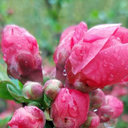Polysaccharides from Epimedium koreanum Nakai with immunomodulatory activity and inhibitory effect on tumor growth in LLC-bearing mice.
Ключови думи
Резюме
BACKGROUND
Epimedium koreanum Nakai is documented as tonic herbal in China for over a thousand years and has the potential to enhance the body's immunity according to the theory of traditional Chinese medicine. Polysaccharides are one of the most important effective compounds in Epimedium koreanum Nakai. Accumulating evidence indicated polysaccharides derived from traditional Chinese medicine have potent immune-enhancing properties and relatively nontoxic effects in cancer treatment. However, information about immunological regulation in tumor of Epimedium koreanum Nakai polysaccharides is limited and the reports of purification, characterization of polysaccharides have remained less. The purpose of our study was to further investigate the active polysaccharides from Epimedium koreanum Nakai by evaluating the immune-regulation activities in tumor-bearing mice and provide reasonable explanation for traditional application.
METHODS
We firstly purified Epimedium koreanum polysaccharide (EPS) from crude extracts and evaluated EPS in vitro using immunological experiments including maturation and Ag presentation function of DCs, CD4 T-cell differentiation and secretion of anti-cancer cytokines. In LLC-bearing mice model, we investigated its antitumor activities through evaluation of tumor cell proliferative activity, calculation of immune organ indexes and relative host immune system function tests.
RESULTS
Results showed that EPS (180 × 104Da) was composed of mannose (Man), rhamnose (Rha), glucuronic acid (GlcUA), galactosamine (GalN), glucose (Glc), galactose (Gal), arabinose (Ara) and fructose (Fuc). Chemical composition assay indicated EPS was a fraction with 28.20% uronic acid content. FT-IR suggested the presence of pyraoid ring in EPS and SEM displayed smooth surface embedded by several pores. Moreover, Our study suggested EPS could remarkably stimulate macrophages to secrete substantial anti-cancer cytokines and promote maturation as well as Ag presentation function of DCs. Strikingly, CD4 T-cell differentiation and increased INF-γ production stimulated by EPS-activated macrophages were observed in the research. Furthermore, EPS exhibited prominent antitumor activities through regulating host immune system function in LLC-bearing mice. Taken together, experimental findings suggested EPS could be regarded as a potential immune-stimulating modifier for cancer therapy.
CONCLUSIONS
Our studies demonstrated the polysaccharide (180 × 104Da) purified from Epimedium koreanum Nakai could promote maturation and Ag presentation function of DCs, increase the level of immunomodulatory cytokines and activate CD4 T-cell differentiation. Furthermore, it may inhibit the tumor growth in LLC-bearing mice through regulating host immune system function.


